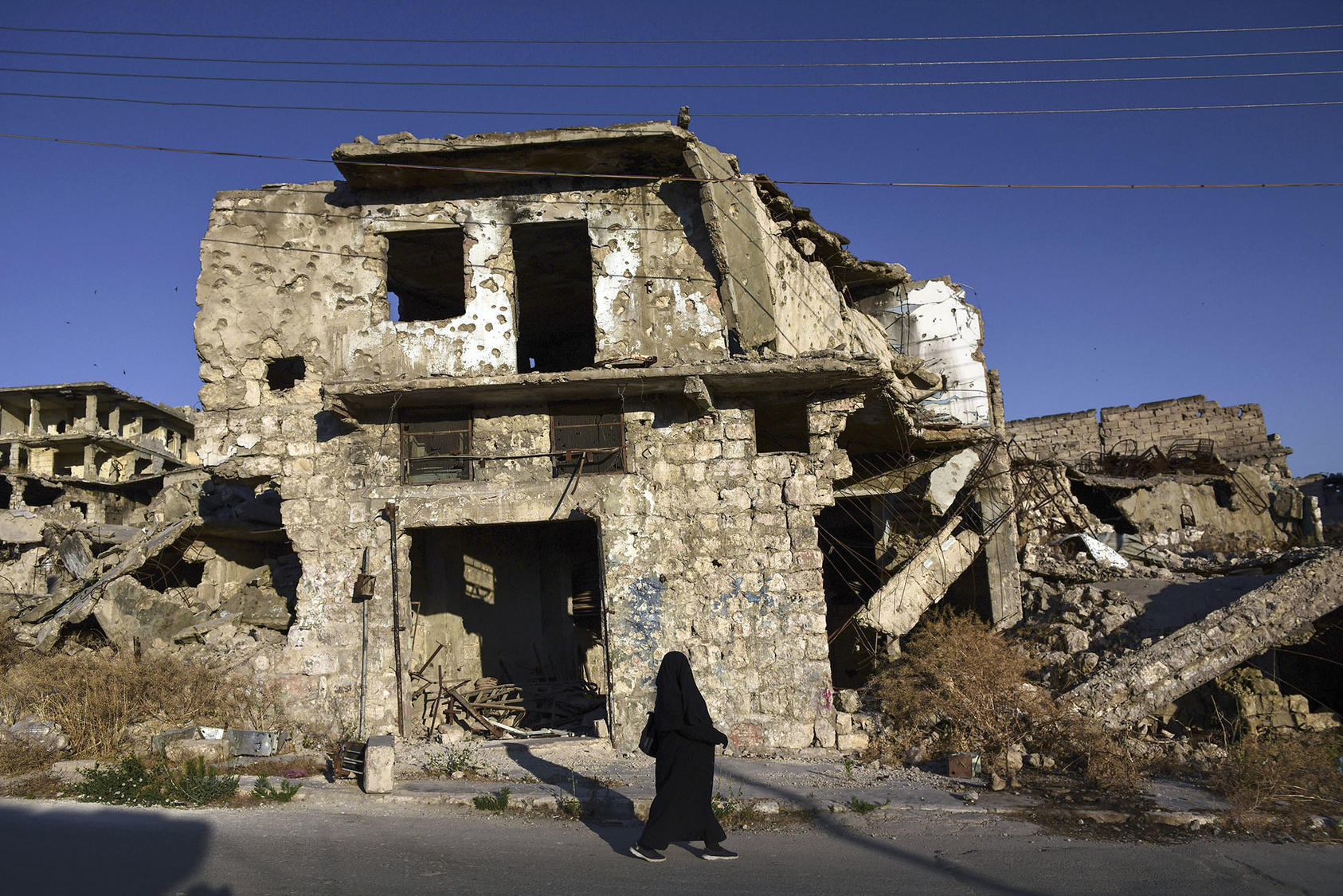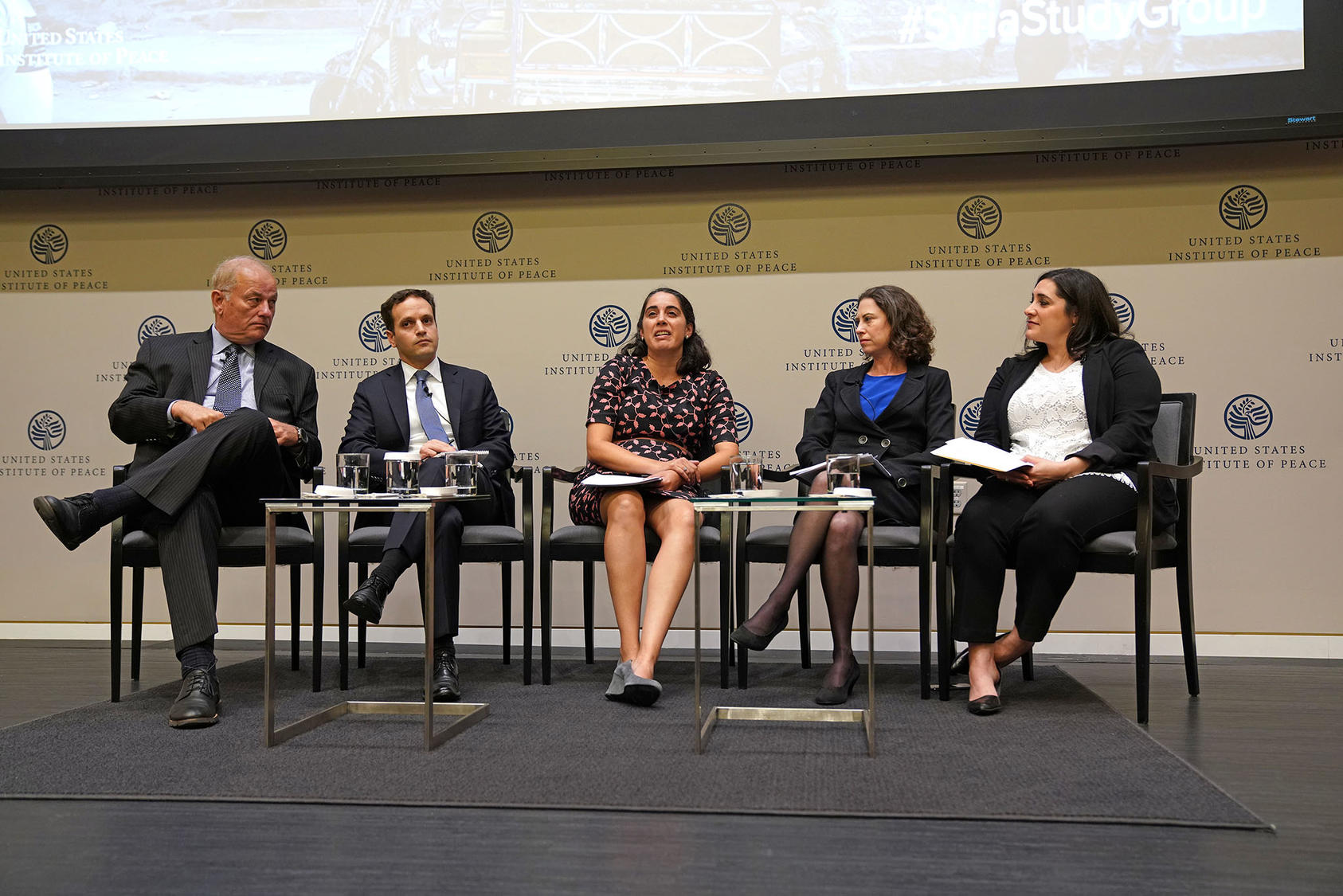The U.S. ‘Cannot Avoid or Ignore’ the War in Syria
The Congressionally Mandated Syria Study Group Issues its Report
A new, congressionally mandated study on Syria policy urges the United States to maintain a military presence and sanctions pressure against the Assad regime, and to help build alternative governance in areas beyond the regime’s rule. The bipartisan Syria Study Group, appointed by Congress, stresses that ISIS in Syria remains a potent threat to the region and to U.S. national security. The Syria Study Group discussed its report at USIP, which at Congress’ direction facilitated the group’s work.

Senators Jeanne Shaheen of New Hampshire and Mitt Romney amplified the study’s central conclusion—the danger of a U.S. disengagement from what arguably is the most strategically vital contest in the Middle East, and one that will shape the future direction of threats from ISIS and allied groups, as well as Iran, Russia and dictatorships worldwide. “Time and again we've seen that when the United States cedes its leadership, those who oppose our values and that rules-based order are all too willing to step in,” said Shaheen, who with the late Senator John McCain, led the creation of the study group. And if the United States diminishes its presence [in Syria], we run the risk of enabling a resurgence of ISIS,” she said. She noted estimates that the extremist group still has some 18,000 fighters at large in Iraq and Syria.
“There is certainly a stream of thought, which is there's all sorts of bad stuff going on throughout the world, including in Syria. And if we're really caring about America, we should just get the heck out of there and let them do to each other what they're going to do,” said Romney. “That frankly was the attitude in our country before the Second World War to a certain degree.”
The study group was modeled in part on the 2006 Iraq Study Group, which helped shape U.S. policy following the U.S. military takeover of Iraq in 2003. The Syria Study Group’s 12 members include policy scholars, former U.S. ambassadors, military veterans and a former commander of the Army’s Special Operations Command. The group’s 76-page report “represents the consensus of all 12 members” of the group, noted Dana Stroul, a Middle East policy specialist who co-chaired the group.
"While some argue that it is too late for a reinvigorated U.S. approach to Syria, we conclude that the United States can still influence the outcome of the Syrian war in a manner that protects U.S. interests," says the study group’s report.
Syria’s Threats to Peace, U.S. Interests
Six members of the group discussed the report at USIP with an audience of diplomats, scholars, journalists and Syria activists. Ambassador Fred Hof, who served as a State Department special envoy on Syria during the Obama administration, cited the report’s finding that “conduct during the war in Syria has established a precedent in which civilians can be targeted and bombed without meaningful international repercussions. … A world that accepts this precedent would be antagonistic to American values, hostile to U.S. interests and dangerous to our national security. Such a world would routinize mass civilian homicide as a survival strategy for dictators and raise recruits for extremists” worldwide.

“ISIS has transitioned to an insurgency, but the United States has not transitioned yet to counter-insurgency” in response, said Vance Serchuck, a fellow at the Center for a New American Security. “If there is an urgent warning embedded in this report, it is precisely that there should be no complacency about, not only the continued threat posed by ISIS in the abstract, but that the tactics and strategy that ISIS has adopted in Syria and Iraq at the moment appears to be ahead of us.”
“We are not in a safe position in Syria even now,” said Kimberly Kagan, a military historian who heads the nonpartisan Institute for the Study of War. “Whether or not we are at any given moment done with a war in our minds or our hearts, that war is not done with us until our enemies and adversaries so decide.”
The particular brutality of this war—more than 500,000 Syrians killed, many by the Assad regime’s use of chemical weapons, “barrel bombs” dropped into residential neighborhoods, starvation or torture—has “smashed … international norms,” said Michael Singh, a co-chair of the study group. Singh, a fellow at the Washington Institute on Near East Policy, directed Middle East affairs at the National Security Council.
Yet, he noted, “It could get worse.” The Assad regime is attacking the northern region of Idlib, a center of opposition to his rule, where an estimated 3 million people, most of them displaced from other zones of warfare, are sheltering. A full assault into Idlib could trigger a new wave of refugee flight to Turkey and other countries. Turkey could attempt a military assault into northeastern Turkey in an effort to wipe out the ethnic Kurdish force there that, with U.S. help, has resisted ISIS and regime attacks. The Syrian war still could metastasize into “a wider war between Iran and Israel,” Singh said. And civil warfare could re-ignite within the 60 percent of the country that the regime now controls, often tenuously.
Engagement Is Not Futile
In U.S. policy debates, some people tend to regard Syria, along with Iraq and Afghanistan, as a “forever war,” said Melissa Dalton, a former Defense Department policy and planning specialist now at the Center for Strategic and International Studies. “In reality, the current approach in Syria is far different,” she said. “It's a much smaller U.S. footprint operating within a coalition framework” supporting the Syrian Democratic Forces, who hold the country’s northeast. “What our Syrian partners have achieved on the ground with our support should not be discarded with a premature withdrawal and should be instead buttressed” with diplomatic, economic and democracy support that is “fully within the writ of U.S. statecraft. … It's about exerting concentrated U.S. leadership in concert with our allies and partners.”
The study group recommends a mix of military deterrence, toughened sanctions against the Assad regime and diplomacy in combination with allies to raise the costs to Russia and Iran of their support for the Assad dictatorship. The group calls for particular diplomacy focused on Turkey and its complicated connection to the Syrian crisis. Turkey’s long-running battle with its ethnic Kurdish minority leads it to oppose the U.S. cooperation with Kurdish forces in northeastern Syria.
Playing the Long Game
“The best end state in Syria is one in which a Syrian government is viewed as legitimate by its own population,” and can govern independently and prevent extremism and terrorist violence, the study group’s report says. That will require a re-shaped Syrian state based on “an updated political and social compact … decentralized governance and equitable resource allocation,” the report says.
Amid the war, USIP has worked in recent years to lay foundations for an eventually peaceful Syria, supporting mediation to reduce conflicts between ethnic Arab and Kurdish villages and thus let displaced families return home. In war-torn countries such as Syria that offer no immediate prospect for national-level settlement, such local-level peace processes are inexpensive investments that can help build leadership, precedents and capacities for eventual peacemaking when conditions permit. Such local peacemaking initiatives also are among USIP’s methods to counter the appeals of ISIS and other extremist groups.
In Syria’s neighbor, Iraq, USIP supports similar, local peace efforts in areas scarred by ISIS violence to help prevent conflict and stabilize communities. Such accords there, as at Tikrit, Mahmoudiya and al-Hawija, have permitted the return home of more than 600,000 displaced people, about 16 percent of Iraq’s peak displaced population following the ISIS war.
The Syria Study Group is the latest of numerous inquiries on foreign policy or national security problems that Congress has directed USIP to assist. Congress, which created and funds USIP, at times has tasked the Institute to facilitate such studies, as in the current case. At other times Congress has mandated USIP to conduct such independent policy inquiries itself. Congress recently directed USIP to develop “a comprehensive plan to prevent extremism in the Sahel, Horn of Africa, and Near East.” In response, the Institute formed a Task Force on Extremism in Fragile States, co-chaired by former Governor Thomas Kean and former Representative Lee Hamilton, which delivered its report to Congress in February.


